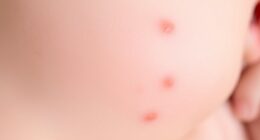When it comes to caring for our children, the decisions we make can greatly impact their health and growth.
As parents, we are constantly bombarded with information on what to feed our newborns, but finding the best nutrition choices can be overwhelming.
However, by understanding the essential components that form the foundation of a healthy diet for your baby, you can navigate this journey with confidence and secure a strong start for your child.
Key Takeaways
- Follow evidence-based recommendations for newborn nutrition from trusted sources like 'Pregnancy, Childbirth, and the Newborn' and 'Mayo Clinic Guide'.
- Introduce solid foods gradually around 6 months, monitoring for allergies and consulting experts for allergen sensitivities.
- Monitor newborn growth closely with regular weight, length, and head circumference tracking for early issue detection.
- Learn practical baby care techniques like swaddling and feeding schedules to ensure proper nutrition and development.
Supplemental Nursing System Breastfeeding Device
For parents seeking a reliable solution to address breastfeeding challenges, the Supplemental Nursing System Breastfeeding Device offers a versatile and user-friendly option. Made of PP and silicone, this breastfeeding assist device is suitable for mothers with different figures and helps with baby feeding by addressing issues like lack of breast milk, flat nipples, and nipple confusion.
With an adjustable neck length, easy installation, scale indicator, and flow control, this durable and safe device provides the necessary support for a smoother breastfeeding experience. Its compact dimensions of 4.72 x 2.95 x 0.98 inches and lightweight of 1.62 ounces make it convenient for everyday use. The Supplemental Nursing System is a valuable tool for mothers looking to enhance their breastfeeding journey.
Best For: Parents seeking a versatile breastfeeding assist device to address feeding challenges with their baby.
Pros:
- Adjustable neck length for different figures
- Helps with issues like lack of breast milk and nipple confusion
- Durable, safe, and easy to install with scale indicator and flow control
Cons:
- Limited customer reviews available
Pregnancy, Childbirth, and the Newborn: The Complete Guide
When considering nutrition choices for newborn babies, prioritizing evidence-based recommendations can greatly benefit expectant parents seeking a detailed guide. The book 'Pregnancy, Childbirth, and the Newborn: The Complete Guide' comes highly recommended for its informative and realistic approach. It provides medically accurate information, educates readers on various choices during pregnancy and childbirth, and offers a balanced view on different options.
Covering proactive exercises for childbirth preparation, birthing techniques, interventions like c-sections, and newborn care, this book caters to diverse birthing preferences without judgment. Readers praise its thorough nature, practical advice, and detailed information on topics like breech babies and holistic childbirth approaches. With illustrations demonstrating techniques and exercises, this guide supports expectant parents in preparing for childbirth and managing postpartum recovery, making it a valuable resource for those setting out on the journey of parenthood.
Best For: Expectant parents seeking a comprehensive and realistic guide for pregnancy, childbirth, and newborn care.
Pros:
- Provides medically accurate information and educates on various choices during pregnancy and childbirth.
- Offers a balanced view on different birth options without judgment.
- Includes detailed information on topics like breech babies and holistic childbirth approaches.
Cons:
- Primarily focused on the US and Canada, may not cover specific regional practices in other countries.
Mayo Clinic Guide to Your Baby's First Years (2nd Edition)
In the Mayo Clinic Guide to Your Baby's First Years (2nd Edition), new parents can rely on its thorough and scientifically grounded content to guide the nutrition choices for newborn babies effectively. This complete guide offers valuable information, including useful illustrations and diagrams, making it an excellent reference for both mothers and birthing partners.
Parents can find relief from anxiety by accessing the well-explained content, tailored to today's parenting situations. With the book's organization targeting quick access to relevant information, such as expected milestones and practical advice, it serves as a must-have resource for new parents. Its up-to-date information and ease of use further solidify its reputation as a 5-star recommendation for those navigating the journey of their baby's first year.
Best For: New parents seeking a comprehensive and scientifically grounded guide for navigating their baby's first year.
Pros:
- Thorough and scientifically grounded content.
- Valuable information with useful illustrations and diagrams.
- Relief from anxiety with well-explained content tailored to today's parenting situations.
Cons:
- May be overwhelming for some readers due to the depth of information.
Newborn 101: Expert Nurses' Guide for Caring for Your Baby at Home
Ideal nutrition choices for newborn babies cater to their delicate developmental needs, ensuring their growth and well-being from the very start. When caring for your baby at home, expert nurses offer invaluable guidance, as seen in the book 'Newborn 101: Secrets from Expert Nurses on Preparing and Caring for Your Baby at Home.' This extensive resource covers a wide range of topics from pre-delivery to the first year of your newborn's life. Readers praise the book for its detailed content on pregnancy, labor, safety, postpartum, and newborn care.
While some critics desired more focus on baby care techniques like swaddling, the overall consensus is overwhelmingly positive. Professional endorsement from a Newborn Care Expert and Registered Nurse underscores the book's informative and practical nature, making it a go-to guide for new parents and caregivers.
Best For: New parents and caregivers seeking comprehensive guidance on newborn care from pregnancy to the first year of their baby's life.
Pros:
- Detailed coverage of pregnancy, labor, safety, postpartum, and newborn care.
- Valuable insights and solutions for first-time parents and caregivers.
- Professional endorsement for following standards approved by the American Academy of Pediatrics.
Cons:
- Some reviewers wished for more focus on practical baby care techniques like swaddling.
Super Nutrition for Babies, Revised Edition: Nourishing Your Baby from Birth to 24 Months
For parents seeking a thorough guide on nourishing their newborns from birth to 24 months, 'Super Nutrition for Babies, Revised Edition' is a highly recommended resource that offers evidence-based advice and practical recipes. The book has garnered positive reviews highlighting its focus on actual food science, following the Weston A. Price Foundation model, and providing recipes for each growth stage. Readers praise its usefulness for the baby's feeding journey and urge others to buy and follow its guidelines. The content covers the importance of starting children on the right nutritional path early, provides building blocks for child nutrition, and includes valuable information for nursing mothers, pregnancy, and formula recipes. While some readers regret not having the book earlier, concerns have been raised regarding certain beliefs expressed within the text.
Best For: Parents who are interested in evidence-based advice and practical recipes for nourishing their newborns from birth to 24 months.
Pros:
- Focuses on actual food science and follows the Weston A. Price Foundation model.
- Provides recipes for each stage of growth from baby to toddlerhood.
- Includes valuable information for nursing mothers, pregnancy, and formula recipes.
Cons:
- Some readers may be concerned about certain beliefs expressed within the text.
Haakaa Gen.3 Silicone Supplemental Nursing System Feeding Bottle Combo
When seeking a feeding solution that offers versatility and ease of use for newborn babies, consider the Haakaa Gen.3 Silicone Supplemental Nursing System Feeding Bottle Combo. This feeding system is made from food-grade silicone, ensuring it's safe for your little one as it's free from BPA, PVC, and phthalates. It's designed to assist with latching problems, low milk supply, and providing extra nourishment when needed.
The feeding tube set comes with multiple control options, allowing you to customize the feeding experience. Additionally, this system is compatible with various attachments for different feeding stages, making it a practical choice for parents. With easy cleaning and compatibility with dishwashers, microwaves, and boiling water, the Haakaa Gen.3 Silicone Supplemental Nursing System Feeding Bottle Combo offers convenience and peace of mind.
Best For: Parents looking for a versatile feeding solution to assist with latching problems and low milk supply.
Pros:
- Made from food-grade silicone, ensuring safety for babies.
- Offers multiple control options for customized feeding.
- Compatible with various attachments for different feeding stages.
Cons:
- Some users experienced issues with tube size and flow control.
Enfamil Standard Flow Soft Nipples, Latex-Free & BPA Free, 12 Count
Opt for the Enfamil Standard Flow Soft Nipples for a convenient and safe feeding solution suitable for most infants. These BPA and latex-free nipples are vented for best air flow and come individually wrapped for hygiene. With medium flow ideal for most babies, these nipples can be easily disinfected in a standard sterilizer, making maintenance hassle-free.
Compatible with various bottle types, including Nursette bottles and Enfamil plastic bottles, these nipples offer versatility and ease of use. The product dimensions are 6.5 x 5.5 x 5.25 inches, and it weighs 8.2 ounces. Hand wash care instructions guarantee longevity. Customers have praised the product's quality, compatibility with different bottles, and the positive impact on feeding experiences.
Best For: Parents looking for a convenient and safe feeding solution suitable for most infants.
Pros:
- BPA and latex-free for safe feeding.
- Vented design for optimal air flow.
- Easy maintenance with compatibility for standard sterilizers.
Cons:
- Hand wash care instructions may be time-consuming for some users.
What to Expect the First Year
Curious about how to navigate the nutritional needs of your newborn baby during their first year?
The first year of your baby's life is filled with exciting milestones and rapid growth. During this time, you can expect your baby to triple their birth weight, develop their taste preferences, and move to solid foods. Monitoring their growth, making sure they receive enough breast milk or formula, and introducing age-appropriate solid foods gradually are crucial.
As your baby reaches each month, their nutritional requirements will evolve, requiring adjustments in feeding schedules and food choices. Consulting with your pediatrician regularly and staying informed about your baby's developmental stages will help you navigate the nutritional journey successfully throughout their first year.
Best For: New parents looking for a comprehensive guide to navigate the first year of their baby's life.
Pros:
- Structured month-by-month information for easy reference.
- Helpful tips for registry preparation and easing parental anxieties.
- Detailed content surpassing online resources for in-depth knowledge.
Cons:
- Dense content may be overwhelming for some readers.
The Best Homemade Baby Food on the Planet
For parents seeking a comprehensive guide to preparing nutritious homemade baby food, 'The Best Homemade Baby Food on the Planet' offers a wealth of easy-to-make recipes and expert advice. With over 200 recipes curated by a registered dietician and a registered nurse, this book stands out for its simplicity and time-saving features. It provides a clear timetable for introducing foods, tips for freezing meals, and essential nutrient information vital for your baby's development. Positive reviews highlight the book's creative and healthy recipes, making it suitable for babies starting solids to toddlers. Parents have found it valuable for meal planning and nutrition education, with some even incorporating the recipes into family meals. However, some concerns have been raised about the lack of emphasis on breastfeeding and the focus on purees over ideas for older babies. Overall, it's a recommended resource for creating healthy homemade baby food.
Best For: Parents looking for a variety of creative and healthy homemade baby food recipes that are easy to make and time-saving.
Pros:
- Offers over 200 nutritious homemade baby food recipes.
- Provides a clear timetable for introducing foods and tips for freezing meals.
- Authored by a registered dietician and a registered nurse, ensuring expert advice on essential nutrients for babies.
Cons:
- Lack of emphasis on breastfeeding and introducing solids to breastfed babies.
Maternal-Newborn Nursing Care: Best Evidence-Based Practices
When considering nutrition choices for newborn babies, nursing professionals seeking evidence-based practices will find valuable guidance in the topic of Maternal-Newborn Nursing Care. This thorough guide offers essential information on antepartum, labor and delivery, and postpartum care. Nurses, nurse practitioners, and nurse midwives have praised this book for its easy-to-understand content and practical insights.
While some users noted discrepancies in lab values compared to full OB textbooks, the key points at the end of each chapter aid in learning and reference. Students in nursing programs have found this resource beneficial for maternal care plans, making it a must-have during OB rotations. Overall, this book is highly recommended for anyone seeking reliable information on maternal-child nursing and is a valuable tool for clinical practice.
Best For: Nursing students, nurse practitioners, and nurse midwives seeking a concise and practical guide to maternal-newborn nursing care.
Pros:
- Easy-to-understand content with essential information on antepartum, labor, and postpartum care.
- Valuable resource for maternal care plans and clinical practice.
- Convenient size for carrying during clinicals and helpful key points at the end of each chapter.
Cons:
- Discrepancies in lab values compared to full OB textbooks.
TOYANDONA 1 Set Breastfeeding Device Color Box Auxiliary Open Milk Pp
As new parents exploring the world of newborn care, one key feature of the 'TOYANDONA 1 Set Breastfeeding Device Color Box Auxiliary Open Milk Pp' is its adaptability for addressing common breastfeeding challenges faced by mothers. This device is made of premium PP and silicone materials, offering adjustability and flexibility for the mother's convenience. It's specifically designed to help with issues like nipple confusion, flat nipples, and lack of breast milk. The product is easy to install and use, featuring a scale indicator and flow control for better monitoring. Additionally, its suitability for mothers with different body types enhances its practicality. The package includes a Breastfeeding Assist Device made of high-grade materials, ensuring durability and functionality.
Best For: Parents looking for a breastfeeding device that can help address common breastfeeding challenges such as nipple confusion and flat nipples.
Pros:
- Made of premium PP and silicone materials.
- Adjustable and flexible for mother's convenience.
- Easy to install and use with scale indicator and flow control.
Cons:
- Average rating of 3.1 out of 5 stars based on 3 ratings.
Iconikal Anti-Colic Vented Baby Feeding Bottle, 4-Ounce, 3-Pack
Featuring vented bases to reduce air ingestion, the Iconikal Anti-Colic Vented Baby Feeding Bottle, 4-Ounce, 3-Pack is a top choice for newborns seeking relief from colic and latching issues. The super-soft orthodontic bottle nipples promote natural latching, making feeding easier for both babies and parents. These BPA-free plastic bottles are designed for easy cleaning without the need for bulky sterilization kits. Compatible with MAM replacement nipples, these bottles offer versatility and convenience. Customers have praised the self-sterilization feature, dishwasher and microwave safe design, and the inclusion of pacifiers with the bottles. With an average rating of 4.7 out of 5 stars from 399 ratings, this anti-colic bottle set provides comfort and practicality for both babies and caregivers.
Best For: Newborns experiencing colic or latching issues who prefer a bottle with vented bases and super-soft orthodontic nipples for natural latching.
Pros:
- Vented bases reduce air ingestion, helping prevent colic and discomfort in babies.
- Super-soft orthodontic bottle nipples promote natural latching, making feeding easier.
- Easy to clean design without the need for bulky sterilization kits, providing convenience for caregivers.
Cons:
- Some users may find the 4-ounce size of the bottles too small for longer feeding sessions.
Super Nutrition for Babies: The Right Way to Feed Your Baby for Optimal Health
For parents seeking valuable guidance on best nutrition for their newborn babies, 'Super Nutrition for Babies: The Right Way to Feed Your Baby for Ultimate Health' is a must-read resource. This book has been praised for its insightful information on feeding babies and pregnancy in an easy-to-read format. It emphasizes the significance of nutrition for babies, highlighting the benefits of incorporating high-quality animal foods into their diets.
Divided into chapters for each stage of eating from infancy through the toddler years, it provides practical advice and includes various categories of foods and recipes. Many families have reported positive changes in their kitchen habits and a focus on whole foods after following the book's guidelines. Despite some critiques, the overall impact and recommendations from readers have been overwhelmingly positive, making this book a valuable investment in your child's health.
Best For: Parents looking for comprehensive guidance on nutrition for their newborn babies.
Pros:
- Valuable information on feeding babies and pregnancy
- Easy-to-read format with practical advice
- Emphasizes the importance of high-quality animal foods for optimal health
Cons:
- Inclusion of references to Dr. Sears may be a drawback for some readers
The Happiest Baby on the Block: Revised and Updated Edition
When seeking effective methods to calm newborn babies and build a strong connection, 'The Happiest Baby on the Block: Revised and Updated Edition' by Dr. Karp stands out as an invaluable resource. Dr. Karp introduces the 5 Ss—swaddling, side or stomach position, shushing, swinging, and sucking—as a method to soothe babies, shedding light on the calming reflex and the fourth trimester concept. Practical tips and step-by-step instructions in the book have proven immensely helpful to parents during challenging moments, with testimonials highlighting the effectiveness of the techniques in calming fussy babies and improving sleep for both babies and parents.
Readers recommend this book as a must-read for new parents seeking an empathetic and proven approach to soothing babies, praising its methodical and extensive strategies for addressing newborn fussiness.
Best For: New parents looking for practical and proven techniques to calm and soothe their newborn babies.
Pros:
- Reassuring tone and practical teachings from Dr. Karp
- Well-structured content providing step-by-step guidance
- Relatable instances and real-life examples for new parents to connect with
Cons:
- Repetition in content may be noticed
Baby-Led Feeding: A Natural Way to Raise Happy, Independent Eaters
Optimizing a newborn's nutrition journey, baby-led feeding stands out as an empowering approach for fostering happy, independent eaters. This method allows babies to explore various foods at their own pace, promoting self-regulation and developing healthy eating habits. With baby-led feeding, infants can engage their senses, enhance fine motor skills, and learn to recognize hunger and fullness cues early on.
By offering a variety of nutritious foods in appropriate textures and sizes, parents can support their child's development while encouraging a positive relationship with food. This natural approach not only simplifies mealtime but also nurtures independence and confidence in little ones as they grow and explore the world of flavors and textures around them.
Best For: Parents looking to introduce their babies to solid foods in a natural, self-regulated way that promotes independence and healthy eating habits.
Pros:
- Extensive understanding of baby-led weaning
- Delicious and diverse recipes, including preparation details and nutrition information
- Guidance on introducing new foods and supporting child development
Cons:
- May not appeal to parents who prefer traditional spoon-feeding methods
Factors to Consider When Choosing Nutrition for a Newborn

When choosing nutrition for a newborn, we need to contemplate their specific nutrient requirements.
The numerous benefits of breastfeeding are important to consider.
The various formula feeding options available should also be explored.
The appropriate time for introducing solids is a key decision in a baby's diet.
Potential allergies and sensitivities need to be taken into account.
Nutrient Requirements
Considering the specialized nutrient requirements of newborn babies is essential when selecting their nutrition for best growth and development. Newborns have distinct needs compared to older infants and children, requiring specific nutrients like proteins, fats, carbohydrates, vitamins, and minerals important for their rapid growth and development.
Breast milk stands out as the best source of nutrition for newborns, offering a perfectly tailored balance of essential nutrients. For formula-fed infants, specialized infant formulas are available to replicate the composition of breast milk.
As newborns grow rapidly in their first year of life, their nutrient requirements evolve necessitating adjustments in their diet to meet their changing needs. Prioritizing these essential nutrients is crucial for ensuring the healthy development of newborn babies.
Breastfeeding Benefits
Moving from the discussion of nutrient requirements for newborn babies, let's now focus on the significant advantages of breastfeeding when deciding on the best nutrition for a newborn.
Breastfeeding provides important nutrients and antibodies that shield newborns from infections and diseases. The composition of breast milk adjusts to cater to the evolving nutritional needs of the baby, aligning with their growth and development stages.
Additionally, the act of breastfeeding fosters a strong emotional bond between the mother and baby, promoting a sense of security and connection. Research indicates that breastfeeding is associated with a decreased risk of allergies, obesity, and certain chronic illnesses in later stages of life for the baby.
Additionally, breast milk's easy digestibility aids in reducing gastrointestinal issues and enhances overall gut health in newborns.
Formula Feeding Options
In selecting nutrition for a newborn, caregivers can explore various formula feeding options tailored to meet specific dietary needs and preferences. Formula feeding choices for newborns include ready-to-feed formula, powdered formula, and concentrated liquid formula. Each type of formula comes with specific preparation instructions, storage requirements, and shelf life after opening.
Some formulas are specially formulated for conditions like cow's milk protein allergy, lactose intolerance, or for preterm infants. Consulting with a healthcare provider before selecting a formula is important to make sure it aligns with the baby's nutritional requirements.
Formula feeding allows caregivers to accurately monitor the baby's intake and can be a convenient alternative for parents who are unable to breastfeed.
Introduction to Solids
When it comes to choosing nutrition for a newborn, exploring the introduction to solids is a natural progression that offers a variety of factors to ponder. Starting around 6 months old, babies may show signs of readiness for solid foods, such as sitting up and showing interest in what others are eating.
Introducing solids gradually is essential to help meet a baby's increasing nutritional needs, as breast milk or formula alone may not suffice. Common first foods include single-grain cereals, pureed fruits and vegetables, and mashed proteins like meat or legumes.
It's important to watch for signs of allergies, introduce new foods one at a time, and seek guidance from a pediatrician on solid food introduction.
Allergies and Sensitivities
Considering potential allergies and sensitivities is important when selecting nutrition for a newborn, as these factors can greatly impact their health and well-being.
Newborns may develop allergies to foods like cow's milk protein, soy, nuts, eggs, and wheat, leading to symptoms such as skin rashes, digestive issues, colic, fussiness, and respiratory problems.
Breastfeeding mothers should be cautious of their diet as allergens can pass through breast milk. When introducing solid foods, it's advisable to do so gradually, one at a time, to watch for adverse reactions.
Consulting with a pediatrician or allergist is critical if there are concerns about allergies or sensitivities. They can offer guidance on testing and safe feeding practices to ensure the newborn's well-being.
Feeding Schedules
After addressing potential allergies and sensitivities, the next aspect to contemplate in selecting nutrition for a newborn is establishing appropriate feeding schedules to guarantee their peak growth and development. Newborns typically require feeding every 2-3 hours, even at night, to make sure they receive essential nourishment.
Feeding on demand, guided by hunger cues like rooting or crying, is common and beneficial. Breastfed babies may feed more frequently due to the quick digestion of breast milk. Setting a feeding routine can help regulate hunger patterns and provide predictability in their daily routine.
Monitoring feeding times and durations is vital to track intake and make sure newborns are getting enough nourishment for healthy growth. This structure promotes a healthy feeding schedule, aiding in the overall well-being of the newborn.
Growth Monitoring Tips
Regularly tracking your newborn's growth through monitoring weight gain, length, and head circumference is important to guarantee their healthy development. Healthcare professionals provide growth charts that allow comparison of your baby's growth to standard measurements based on their age and sex.
Consistent growth monitoring is important as it helps in the early detection of any potential issues, enabling timely intervention and support. Since growth patterns can vary among infants, personalized growth monitoring is essential to track your baby's unique development accurately.
If you have any concerns regarding your baby's growth, it's advisable to discuss them with your pediatrician promptly. This proactive approach ensures that any problems are addressed promptly, promoting your baby's best health and well-being.
Hydration Needs
When selecting nutrition for a newborn, it's important to prioritize understanding their hydration needs. Newborns have small stomach capacities, so they require frequent feedings to remain essential feedings to stay hydrated. Whether through breast milk or formula, these sources provide the necessary hydration for newborns.
It's vital to watch for signs of dehydration such as fewer wet diapers, dark urine, or a dry mouth. Monitoring your baby's hydration levels is critical, and if any concerns arise, consulting a healthcare provider is recommended.
Proper hydration plays a significant role in the overall health and well-being of newborns, emphasizing the importance of meeting their specific hydration requirements to support their growth and development.
Frequently Asked Questions
What Are the Benefits of Using a Supplemental Nursing System Breastfeeding Device?
Using a supplemental nursing system breastfeeding device can help secure your baby receives enough milk while also stimulating your milk supply. It allows for direct breastfeeding and supplementation simultaneously, promoting bonding and peak nutrition.
How Can Parents Ensure They Are Providing Adequate Nutrition for Their Newborn During the First Year?
We guarantee our newborn gets high-quality nutrition by carefully selecting nutrient-rich foods, consulting professionals, and staying vigilant about feeding schedules. Our dedication to providing the best sets a solid foundation for their growth and development.
Are There Any Specific Feeding Techniques Recommended in Baby-Led Feeding: a Natural Way to Raise Happy, Independent Eaters?
We found baby-led feeding to be a great approach in fostering independence and happy eaters. It encourages self-feeding, exploration of various textures, and family mealtime involvement. This method can support a positive relationship with food for your little one.
What Are the Key Factors Parents Should Consider When Choosing Nutrition for Their Newborn?
When choosing nutrition for our newborn, we prioritize quality, freshness, and balance. We aim for natural, whole foods to provide best nourishment. Our decisions revolve around what promotes growth, health, and happiness for our little one.
How Can Parents Ensure They Are Meeting Their Newborn's Nutritional Needs While Following a Baby-Led Feeding Approach?
We focus on balancing nutrients and introducing solids gradually to align with our baby-led approach. By offering a variety of healthy options and observing cues for hunger and fullness, we secure our newborn's nutritional needs are met.
Can Formula Provide the Same Nutrition as Breastfeeding for Newborns?
Many experts agree that the best newborn formula for nutrition can provide the same essential nutrients as breast milk. However, breast milk offers unique antibodies that help protect babies from illness. It’s recommended to consult with a healthcare provider to determine the best feeding option for your newborn.
Conclusion
As parents, we're constantly faced with decisions that impact our child's health and well-being. Choosing the best nutrition for your newborn is essential in setting the foundation for a healthy future. By making informed choices and prioritizing their nutritional needs, we can guarantee that our little ones thrive and grow.
So, as you navigate the world of feeding your newborn, remember to stay informed, seek guidance, and always put your baby's health first. The journey to ideal nutrition for your baby is just beginning…

























